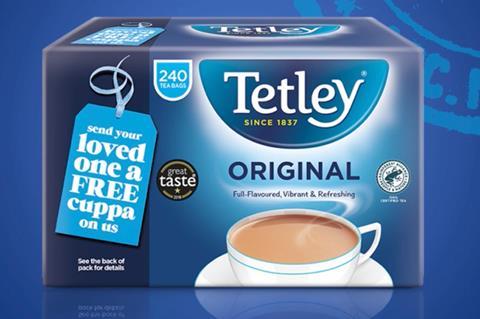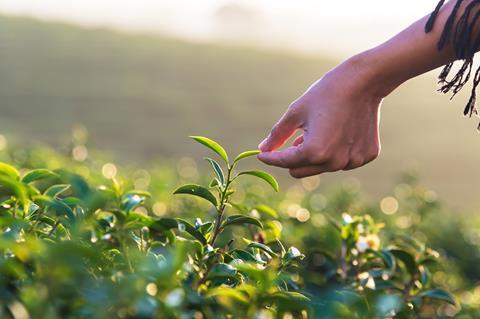
Tesco, Tetley, and Twinings are among major tea buyers failing to address human rights abuses on a number of plantations around the world, a new report has claimed.
Workers on tea plantations in the biggest production countries like India and Sri Lanka are suffering from unfair wages, inhumane living standards and poor health and safety conditions, according to a new report by the Business & Human Rights Resource Centre out today.
There were also reports of workers being harassed, intimidated or dismissed for their involvement in unions and protests.
Using data tracked over the past year, the international NGO’s latest tea supply chain report highlighted a list of alleged human rights abuses happening across factories and estates that supply a number of British brands and retailers.
It identified 16 brands and retailers buying from the factories and estates where 47 of the 70 alleged human rights abuses occurred – including Bettys & Taylors, James Finlay, Marks & Spencer, Morrisons, Starbucks, Tesco, Tetley, Twinings, Typhoo and Unilever, which sold most of its tea business including popular brands Lipton and PG Tips to a private equity firm in 2021.
Most of the recorded cases took place in India, followed by Sri Lanka, Bangladesh, Kenya and Uganda. “The remainder of abuses occurred on estates and in factories not listed in the public domain, and so their buyers remain unknown”.
Companies trading in tea managed to “distance themselves from rights violations taking place on plantations” due to their opaque supply chains and lack of oversight on the ground, claimed BHRRC labour rights researcher Kate Jelly.
“Although tea companies recognise the entrenched human rights challenges within the tea supply chain, they are failing to take sufficient action to address them,” Jelly said.
“They appear to have overall policy commitments to human rights, but there is limited evidence on how these commitments are implemented in practice and a general failure to mitigate adverse human rights impacts which are compounded by their purchasing practices.”
A Tesco spokesperson said it was working with its supplier to investigate the allegations in the report and “will move to suspend the tea estates if we don’t get satisfactory engagement.”
“We’re aware that tea supply chains globally face several challenges such as low wages, gender discrimination and poor living conditions for tea workers and smallholders. Addressing these complexities requires a multi-faceted approach with wider industry and governments coming together to drive improvements across the sector.
The majority of the allegations in the report were related to wages, benefits and compensation. The report noted workers were also suffering from estate managers’ responses to rising production costs.
Some companies, including Tetley, Unilever, Tesco and Morrisons, were linked to allegations related to the impacts on workers of estate closures, partial sale or other changes in business structure – which led to wages and benefits unpaid and food rations not provided, the BHRRC said.
Read more: Sainsbury’s promises ‘robust action’ after sexual abuse allegations in its tea supply chain
Morrisons said it was unaware of some of the allegations taking place at the plantations supplying its main buyer, but that it was “taking steps” to address some of the issues around wages via closer engagement with farm level players.
“We recognise that wage issues in tea supply chains are complex, caused by a multitude of factors and cannot be addressed by one stakeholder alone,” it said.
“We are committed to ensuring that everyone who helps to make our products is treated with dignity and respect, in safe and fair workplaces. Where issues are present in the lower tiers of our supply chain we aim to work in close collaboration with our primary suppliers to ensure they have robust systems in place to identify, assess and mitigate risk.”
Tetley has also agreed with several estates for workers to receive a living wage that is incorporated within the contract price. It claimed it had strict due diligence processes in place to make sure any additional payments “reached the intended beneficiaries”.
However, many of the companies called out in the report said they were previously aware of the allegations, which the NGO noted indicated “some effective processes for identifying adverse supply chain human rights impacts”.
The vast majority said they had promptly investigated the cases brought to their attention.

The BHRRC stressed the urgent need for companies to improve supply chain transparency and make their full supplier lists public.
Some companies, including Unilever and Tesco, already do this. Unilever, which has a commitment to living wages for supply chain workers by 2030, said it had distanced itself from many of the plantations facing abuse allegations over the past year.
“The first step to addressing human rights abuses in tea supply chains is for companies to be transparent about where they are sourcing their tea from,” Jelly said.
“Workers have a right to know who is profiting from the tea they are picking – and be able to identify where they must go to voice any grievances.
“Supply chain transparency would also help workers, trade unions, civil society and consumers hold companies accountable for rights violations – and make it easier for companies to be made aware of any rights abuses, allowing them to take steps to address any issues.”
This is not the first time the tea sector has come under fire this year over allegations of human and labour rights abuses on plantations.
A BBC investigation earlier this year found several cases of sexual harassment happening on Kenyan tea farms owned by major suppliers selling into the UK market, including Unilever and James Finlay & Co, which supplies tea to Tesco and Sainsbury’s.



















No comments yet